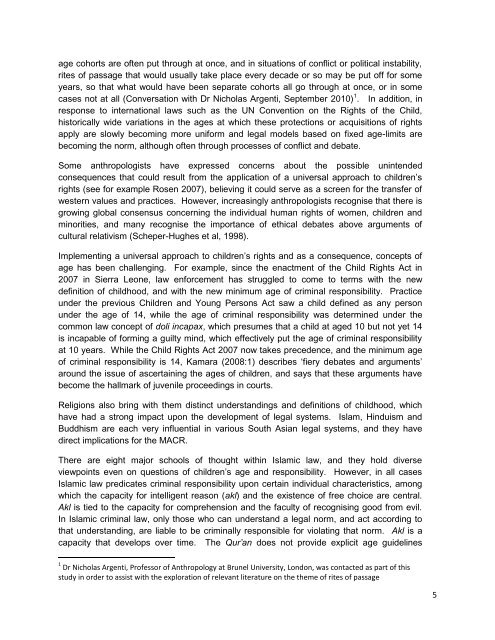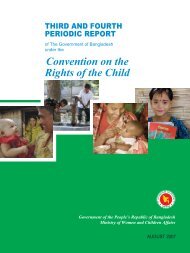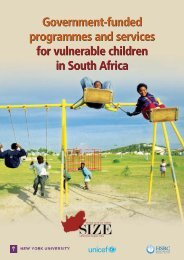Age assessment practices: a literature review & annotated ... - Unicef
Age assessment practices: a literature review & annotated ... - Unicef
Age assessment practices: a literature review & annotated ... - Unicef
You also want an ePaper? Increase the reach of your titles
YUMPU automatically turns print PDFs into web optimized ePapers that Google loves.
age cohorts are often put through at once, and in situations of conflict or political instability,<br />
rites of passage that would usually take place every decade or so may be put off for some<br />
years, so that what would have been separate cohorts all go through at once, or in some<br />
cases not at all (Conversation with Dr Nicholas Argenti, September 2010) 1 . In addition, in<br />
response to international laws such as the UN Convention on the Rights of the Child,<br />
historically wide variations in the ages at which these protections or acquisitions of rights<br />
apply are slowly becoming more uniform and legal models based on fixed age-limits are<br />
becoming the norm, although often through processes of conflict and debate.<br />
Some anthropologists have expressed concerns about the possible unintended<br />
consequences that could result from the application of a universal approach to children‟s<br />
rights (see for example Rosen 2007), believing it could serve as a screen for the transfer of<br />
western values and <strong>practices</strong>. However, increasingly anthropologists recognise that there is<br />
growing global consensus concerning the individual human rights of women, children and<br />
minorities, and many recognise the importance of ethical debates above arguments of<br />
cultural relativism (Scheper-Hughes et al, 1998).<br />
Implementing a universal approach to children‟s rights and as a consequence, concepts of<br />
age has been challenging. For example, since the enactment of the Child Rights Act in<br />
2007 in Sierra Leone, law enforcement has struggled to come to terms with the new<br />
definition of childhood, and with the new minimum age of criminal responsibility. Practice<br />
under the previous Children and Young Persons Act saw a child defined as any person<br />
under the age of 14, while the age of criminal responsibility was determined under the<br />
common law concept of doli incapax, which presumes that a child at aged 10 but not yet 14<br />
is incapable of forming a guilty mind, which effectively put the age of criminal responsibility<br />
at 10 years. While the Child Rights Act 2007 now takes precedence, and the minimum age<br />
of criminal responsibility is 14, Kamara (2008:1) describes „fiery debates and arguments‟<br />
around the issue of ascertaining the ages of children, and says that these arguments have<br />
become the hallmark of juvenile proceedings in courts.<br />
Religions also bring with them distinct understandings and definitions of childhood, which<br />
have had a strong impact upon the development of legal systems. Islam, Hinduism and<br />
Buddhism are each very influential in various South Asian legal systems, and they have<br />
direct implications for the MACR.<br />
There are eight major schools of thought within Islamic law, and they hold diverse<br />
viewpoints even on questions of children‟s age and responsibility. However, in all cases<br />
Islamic law predicates criminal responsibility upon certain individual characteristics, among<br />
which the capacity for intelligent reason (akl) and the existence of free choice are central.<br />
Akl is tied to the capacity for comprehension and the faculty of recognising good from evil.<br />
In Islamic criminal law, only those who can understand a legal norm, and act according to<br />
that understanding, are liable to be criminally responsible for violating that norm. Akl is a<br />
capacity that develops over time. The Qur‟an does not provide explicit age guidelines<br />
1 Dr Nicholas Argenti, Professor of Anthropology at Brunel University, London, was contacted as part of this<br />
study in order to assist with the exploration of relevant <strong>literature</strong> on the theme of rites of passage<br />
5
















